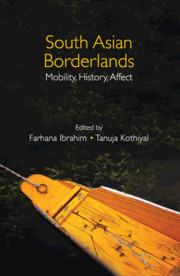Book contents
- Frontmatter
- Contents
- List of Figures and Tables
- Acknowledgements
- Introduction
- 1 Paradise at the Frontier: Kashmir as a Political Terrain and Literary Landscape in the Mughal Empire
- 2 Borders in the Age of Empire and Nation-States: The Honeycomb of Borderlands: Kumaun, Western Tibet and Far Western Nepal
- 3 Borders, Difference, Recognition: On the Cause(s) of Gorkhaland
- 4 Embattled Frontiers and Emerging Spaces: Transformation of the Tawang Border
- 5 Relative Intimacies: Belonging and Difference in Transnational Families across the Bengal Borderland
- 6 Reading Parijat in Nepal: The Poetics of Radical Feminism Negotiating Self and Nation
- 7 Commodity Journeys and Market Circuits: Making Borders ‘Natural’ in Colonial Western Himalayas
- 8 Frontiers, State and Banditry in the Thar Desert in the Nineteenth Century
- 9 Bureaucracy and Border Control: Ethnographic Perspectives on Crime, Police Reform and ‘National Security’ in Kutch, 1948–52
- 10 Frontier as Resource: Law, Crime and Sovereignty on the Margins of Empire
- About the Contributors
- Index
3 - Borders, Difference, Recognition: On the Cause(s) of Gorkhaland
Published online by Cambridge University Press: 17 September 2021
- Frontmatter
- Contents
- List of Figures and Tables
- Acknowledgements
- Introduction
- 1 Paradise at the Frontier: Kashmir as a Political Terrain and Literary Landscape in the Mughal Empire
- 2 Borders in the Age of Empire and Nation-States: The Honeycomb of Borderlands: Kumaun, Western Tibet and Far Western Nepal
- 3 Borders, Difference, Recognition: On the Cause(s) of Gorkhaland
- 4 Embattled Frontiers and Emerging Spaces: Transformation of the Tawang Border
- 5 Relative Intimacies: Belonging and Difference in Transnational Families across the Bengal Borderland
- 6 Reading Parijat in Nepal: The Poetics of Radical Feminism Negotiating Self and Nation
- 7 Commodity Journeys and Market Circuits: Making Borders ‘Natural’ in Colonial Western Himalayas
- 8 Frontiers, State and Banditry in the Thar Desert in the Nineteenth Century
- 9 Bureaucracy and Border Control: Ethnographic Perspectives on Crime, Police Reform and ‘National Security’ in Kutch, 1948–52
- 10 Frontier as Resource: Law, Crime and Sovereignty on the Margins of Empire
- About the Contributors
- Index
Summary
There was a report of new dissatisfaction in the hills, gathering insurgency, men and guns. It was the Indian-Nepalis, this time, fed up with being treated like a minority in a place they were the majority. They wanted their own country, or at least their own state in which to manage their own affairs. Here, where India blurred into Sikkim, and the army did pull-ups and push-ups, maintaining their tanks with khaki paint in case the Chinese grew hungry for more territory than Tibet, it had always been a messy map … despite, ah, despite the mist charging down like a dragon, dissolving, undoing, making ridiculous the drawing of borders.
—Desai (2005: 9)In the summer of 2017, the Gorkhaland movement returned in force. Touched off by suggestions that Bengali would be made compulsory in schools across Darjeeling, this latest agitation plunged the hills into a turmoil not experienced since the violent days of the first Gorkhaland movement in the 1980s. Yet, after months of strikes, internet blackout, state violence and death, the 2017 agitation, like the first in the 1980s and the second three decades later, failed to deliver a separate state of Gorkhaland within India—and with it, the autonomy, belonging and recognition that the Gorkhas of Darjeeling desire.
Unfolding in a corner of India that many know only as an idyllic vacation spot, the Gorkhaland movement has miffed many across the subcontinent. People have wrongfully assumed that it is secessionist (it is not), that foreign hands are at work (of which there is no evidence), that it will eventually fade away (history suggests otherwise). The misunderstandings of the Gorkhaland movement are legion and part of the problem. In this chapter, I want to step back to examine the cause(s) of Gorkhaland—and, in particular, the ways that the interplays of borders, difference and recognition galvanise this and other ethno-political movements in the Darjeeling Hills. As I attempt to show, to respond to the historic question ‘why Gorkhaland?’ in these terms opens a wider questioning of what identities count in the border zones of South Asia? What do not? And what are the politics of such reckonings? I draw on a decade and a half of study of Darjeeling's political culture to shed some light on these questions.
- Type
- Chapter
- Information
- South Asian BorderlandsMobility, History, Affect, pp. 80 - 101Publisher: Cambridge University PressPrint publication year: 2021
- 1
- Cited by



